Introduction
When choosing between cottage cheese and yogurt, you might wonder, is cottage cheese healthier than yogurt? Both offer unique benefits for your health and are packed with essential nutrients. Cottage cheese contains high levels of protein, which support muscle growth and provide lasting energy. Yogurt, on the other hand, boosts digestion and gut health with its probiotics.
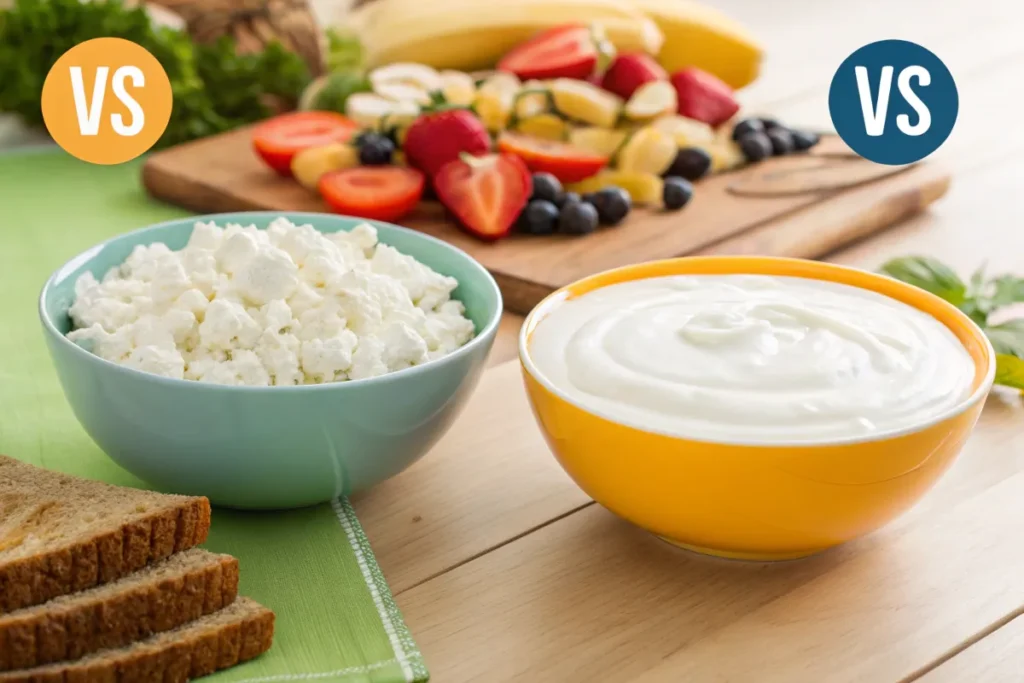
This article compares these two dairy options to help you decide which suits your lifestyle best. You can easily include cottage cheese in your meals, like scrambled eggs with cottage cheese, for a quick and healthy twist. To learn about its health benefits, check out our guide on whether cottage cheese is anti-inflammatory. For meal ideas, try these delicious cottage cheese recipes that are simple and satisfying.
Keep reading as we break down the nutritional differences, uses, and overall benefits of these popular dairy products. By the end, you’ll know which option works better for your health goals!
Table of contents
- Introduction
- Is Cottage Cheese Healthier Than Yogurt? A Nutritional Breakdown
- Health Benefits of Cottage Cheese and Yogurt
- Practical Uses of Cottage Cheese and Yogurt
- Exploring the Differences Between Cottage Cheese and Yogurt
- Creative Ways to Enjoy Cottage Cheese and Yogurt
- Choosing Between Cottage Cheese and Yogurt for Your Health Goals
- Is Cottage Cheese Anti-Inflammatory?
- FAQs About Cottage Cheese and Yogurt
- Final Thoughts on Cottage Cheese and Yogurt
Is Cottage Cheese Healthier Than Yogurt? A Nutritional Breakdown
Comparing Protein Content in Cottage Cheese and Yogurt
Protein plays a key role in maintaining strong muscles and keeping you full throughout the day. Cottage cheese stands out as a protein powerhouse, offering more grams per serving than most yogurts. This makes it a great choice for people focused on muscle-building or staying energized. However, yogurt also provides a good amount of protein, especially Greek yogurt, which can rival cottage cheese in protein levels.
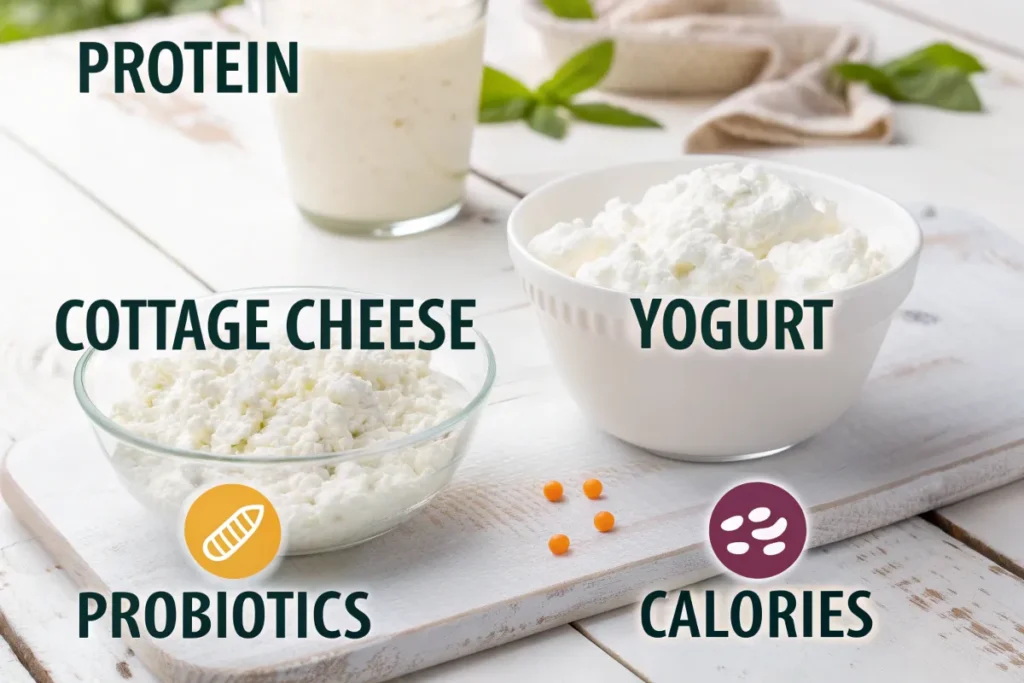
Probiotics in Yogurt vs. Cottage Cheese (Is Cottage Cheese Healthier than Yogurt?)
Gut health is important, and probiotics help keep your digestive system running smoothly. Yogurt is a well-known source of probiotics, making it a favorite for improving digestion and supporting a healthy gut. Although cottage cheese contains fewer probiotics, some varieties now include added live cultures to boost gut health. If you’re looking for probiotics, yogurt may be the better option.
Calories and Fat: Which Is the Healthier Choice?
When comparing calories and fat, both cottage cheese and yogurt have low-fat and full-fat options. Cottage cheese tends to have more calories, especially in its full-fat form, but it also provides healthy fats that keep you satisfied. Yogurt is typically lower in calories and offers a lighter option for those watching their intake. Deciding between the two depends on your dietary needs and goals.
Health Benefits of Cottage Cheese and Yogurt
Is Cottage Cheese Healthier Than Yogurt for Weight Loss?
When it comes to weight loss, both cottage cheese and yogurt can play a role in a healthy diet. Cottage cheese’s high protein content keeps you full longer, reducing the temptation to snack between meals. This makes it an excellent choice for those aiming to manage their calorie intake. Yogurt, especially low-fat or Greek yogurt, is also effective for weight loss. Its probiotics support digestion, which can help your body process food more efficiently.
Which Is Better for Muscle Growth: Cottage Cheese or Yogurt?
If building muscle is your goal, cottage cheese often takes the lead. Its high protein content, particularly casein protein, is digested slowly, providing your muscles with a steady supply of amino acids. This makes it ideal for nighttime snacks or post-workout recovery. Yogurt, while also high in protein, absorbs faster, which can be helpful for immediate recovery after exercise. Both options contribute to muscle growth, but cottage cheese may offer a slight advantage for extended protein supply.
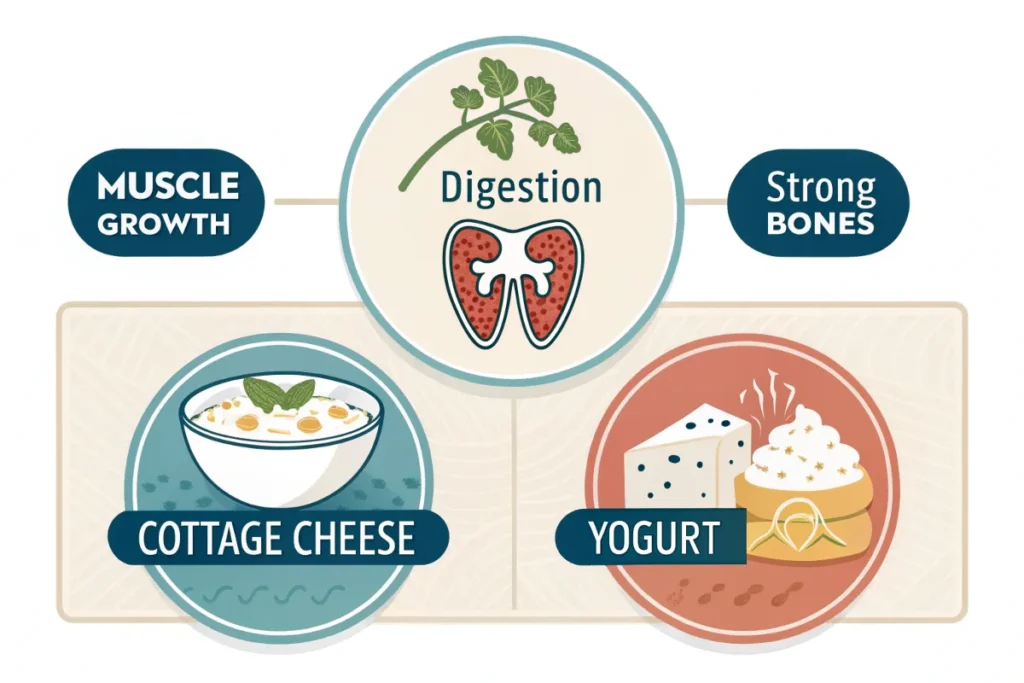
Does Yogurt or Cottage Cheese Offer More Vitamins and Minerals?
Both yogurt and cottage cheese are rich in essential nutrients, but their vitamin profiles differ slightly. Yogurt is an excellent source of calcium, which supports strong bones and teeth. It also contains B vitamins that boost energy and support brain health. Cottage cheese provides calcium too, but it also offers selenium, an important antioxidant. Your choice depends on which nutrients you want to prioritize in your diet.
Practical Uses of Cottage Cheese and Yogurt
Is Cottage Cheese Healthier Than Yogurt for Snacks?
Cottage cheese and yogurt are both versatile and make excellent snacks. Cottage cheese is perfect for savory dishes, like mixing it with fresh veggies or spreading it on crackers. It also pairs well with fruit for a sweet option. Yogurt, with its creamy texture and natural tanginess, is ideal for parfaits, smoothies, or eaten on its own with a drizzle of honey. Whether you prefer a sweet or savory snack, both options are nutritious and delicious.
Cooking and Baking with Cottage Cheese and Yogurt
Cottage cheese and yogurt shine in cooking and baking, each adding unique flavors and textures to recipes. Cottage cheese works well in savory dishes like scrambled eggs or lasagna, while yogurt enhances baked goods by adding moisture and a subtle tang. For a healthy twist, use yogurt as a base for sauces or dressings, or substitute it for sour cream. Cottage cheese can also be blended for creamy dips or incorporated into healthy recipes.

Breakfast Options with Cottage Cheese and Yogurt
Both cottage cheese and yogurt are breakfast staples that start your day off right. Cottage cheese pairs beautifully with fresh fruit, granola, or nuts for a protein-packed meal. Yogurt, especially Greek yogurt, is a favorite for smoothies or parfaits layered with berries and oats. These dairy options are easy to customize, making them perfect for quick, nutritious breakfasts.
Exploring the Differences Between Cottage Cheese and Yogurt
Texture and Taste: Which Do You Prefer?
Cottage cheese and yogurt differ in texture and taste, catering to different preferences. Cottage cheese has a creamy yet slightly lumpy texture, with a mild and slightly salty flavor. This makes it a great choice for savory dishes or paired with fruit. Yogurt, on the other hand, is smooth and creamy, with a tangy taste that varies in intensity depending on the type. Greek yogurt, for example, is thicker and richer than regular yogurt, offering a different experience.
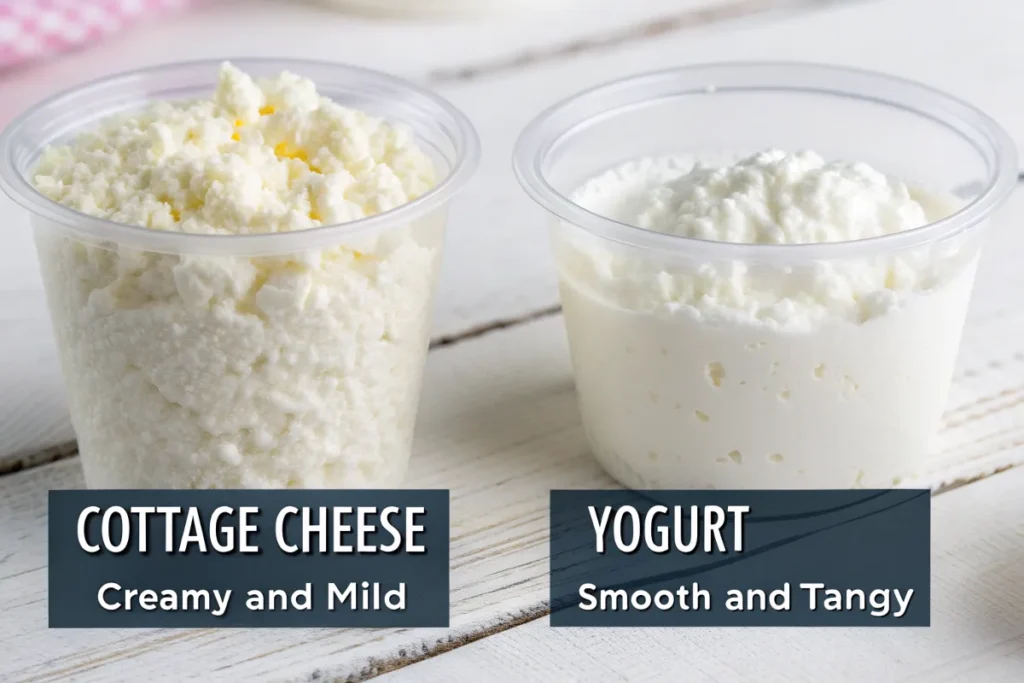
Storage and Shelf Life: Cottage Cheese vs. Yogurt
Proper storage is key to keeping these dairy products fresh. Yogurt generally has a longer shelf life, especially when unopened, making it a convenient option for meal planning. Cottage cheese, due to its high moisture content, tends to spoil faster and should be consumed within a few days of opening. Always check expiration dates and store both in the refrigerator to maintain freshness.
Dietary Restrictions and Preferences
Cottage cheese and yogurt cater to various dietary needs. For individuals who are lactose intolerant, lactose-free options are available for both products. Yogurt often comes in plant-based alternatives like almond, coconut, or soy, making it suitable for vegans or those avoiding dairy. Cottage cheese, while rich in protein, may have fewer non-dairy alternatives, so it may not suit all dietary restrictions.
Creative Ways to Enjoy Cottage Cheese and Yogurt
Sweet Recipes with Cottage Cheese and Yogurt
Cottage cheese and yogurt can both satisfy your sweet tooth while keeping your meal healthy. Cottage cheese pairs well with fresh fruits like pineapple, berries, or peaches, and you can drizzle honey or maple syrup for added sweetness. Yogurt is perfect for creating layered parfaits with granola and fruits or blending into smoothies for a creamy treat. You can also use yogurt as a base for frozen popsicles or mix it with cocoa powder for a guilt-free chocolate mousse.

Savory Dishes Featuring Cottage Cheese and Yogurt
Cottage cheese shines in savory dishes, making it a versatile ingredient for meals. Spread it on whole-grain toast and top it with avocado slices or tomatoes for a quick snack. You can also use it as a creamy filling in stuffed bell peppers or blend it into dips. Yogurt works beautifully as a marinade for meats or as a tangy base for salad dressings and sauces. Add a dollop of yogurt to soups for extra creaminess or mix it into mashed potatoes for a lighter twist.
Quick Meal Ideas Using Cottage Cheese and Yogurt
Both cottage cheese and yogurt are perfect for quick, nutritious meals. Cottage cheese can be combined with scrambled eggs for a protein-packed breakfast, as shown in this easy recipe. Yogurt can be a quick grab-and-go snack or turned into a hearty smoothie bowl topped with nuts and seeds. For a speedy lunch, mix cottage cheese with your favorite veggies, or create a yogurt-based dip to pair with fresh vegetables and pita bread.
Choosing Between Cottage Cheese and Yogurt for Your Health Goals
Is Cottage Cheese Healthier Than Yogurt for a High-Protein Diet?
If you’re focusing on protein, cottage cheese may be the better choice. It provides a higher protein content per serving, especially in the form of casein protein, which digests slowly to keep you full longer. This makes cottage cheese ideal for athletes or anyone following a high-protein diet. Greek yogurt, however, also packs a significant protein punch and is perfect for post-workout recovery due to its faster digestion.

Which Dairy Option Is Better for Gut Health?
For gut health, yogurt takes the lead because of its probiotic content. Probiotics are beneficial bacteria that support digestion and improve overall gut health. Some cottage cheese brands now add live cultures to boost its gut-friendly benefits, but yogurt still remains the top choice for probiotics. If digestion is your priority, yogurt is a clear winner.
Can Cottage Cheese or Yogurt Help with Weight Management?
Both cottage cheese and yogurt can support weight management, but in different ways. Cottage cheese is packed with protein, which reduces hunger and prevents overeating. Yogurt, especially low-fat varieties, offers fewer calories and supports healthy digestion, which may aid in weight loss. Choosing the right option depends on your calorie goals and how you like to incorporate dairy into your meals.
Is Cottage Cheese Anti-Inflammatory?
How Cottage Cheese May Help Reduce Inflammation
Cottage cheese can be part of an anti-inflammatory diet, depending on its ingredients and how it’s made. It contains essential nutrients like calcium, protein, and selenium, which support overall health and may help reduce inflammation. Selenium, in particular, acts as an antioxidant that protects cells from damage caused by inflammation. To maximize these benefits, choose low-sodium or organic cottage cheese, as excessive sodium can contribute to inflammation in some people.

Comparing Cottage Cheese and Yogurt for Inflammation
Yogurt, especially varieties with live probiotics, is often considered anti-inflammatory because it promotes gut health and balances your microbiome. Cottage cheese, while not traditionally associated with probiotics, can offer similar benefits if it includes added live cultures. Both options support a healthy diet, but yogurt might have a slight edge for inflammation due to its probiotic content. However, choosing cottage cheese with minimal additives and a low sodium level can make it just as beneficial.
Incorporating Cottage Cheese into an Anti-Inflammatory Diet
To include cottage cheese in an anti-inflammatory diet, pair it with foods rich in antioxidants, such as fresh fruits, leafy greens, or nuts. You can also use it as a base for savory dips mixed with herbs like turmeric or ginger, which have anti-inflammatory properties. For more tips and ideas, check out this guide on whether cottage cheese is anti-inflammatory.
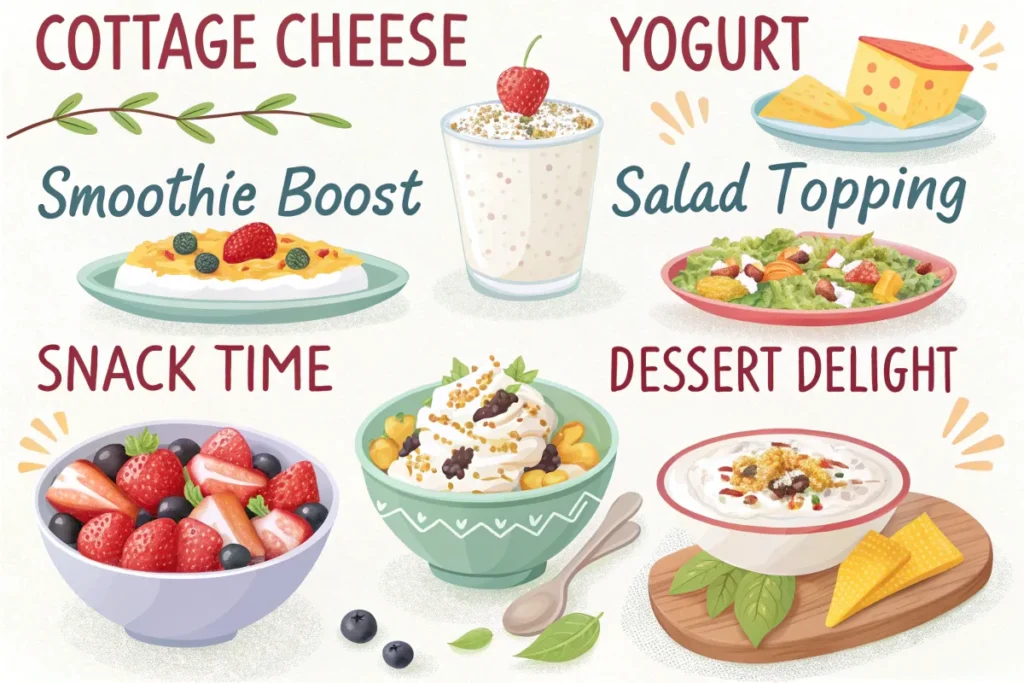
FAQs About Cottage Cheese and Yogurt
Cottage cheese can be anti-inflammatory if it’s low in additives and sodium. Pairing it with anti-inflammatory foods enhances its benefits.
Fatty fish like salmon is considered one of the top anti-inflammatory foods due to its omega-3 content.
Add fresh fruits, honey, or a sprinkle of cinnamon for sweetness. For savory options, mix it with herbs, black pepper, or fresh veggies.
Yes, cottage cheese can be good for the gut, especially if it contains added live probiotics. Pair it with fiber-rich fruits for even better digestion.
Cottage cheese is better for weight loss due to its higher protein content and lower fat levels compared to cream cheese.
Enjoy it as a snack with fruits or veggies, or use it as a base for smoothies. Pair it with high-fiber foods to stay fuller longer.
Low-fat or organic cottage cheese with minimal sodium is the healthiest. Look for brands with live probiotics for added gut health benefits.
Cottage cheese is healthier than sour cream as it is higher in protein and lower in fat. Sour cream is better for occasional indulgence.
Pair cottage cheese with fresh fruits, veggies, or whole-grain crackers. It also works well in scrambled eggs or as a creamy dip base.
Yes, eating cottage cheese daily is fine if paired with a balanced diet. Opt for low-sodium versions to avoid excessive salt intake.
Final Thoughts on Cottage Cheese and Yogurt
Both cottage cheese and yogurt are healthy, versatile, and nutrient-packed options that fit into a balanced diet. Whether you’re looking to lose weight, build muscle, or support gut health, each offers unique benefits. Cottage cheese stands out for its high protein content and creamy texture, while yogurt shines with its probiotics and versatility.

The choice ultimately depends on your personal health goals and taste preferences. If you’re aiming for recipes to try, explore these creative cottage cheese dishes or use yogurt for a lighter twist. No matter what you choose, you’ll be adding a nutritious boost to your day.
Now, it’s your turn! Which one will you pick for your next snack or meal?

